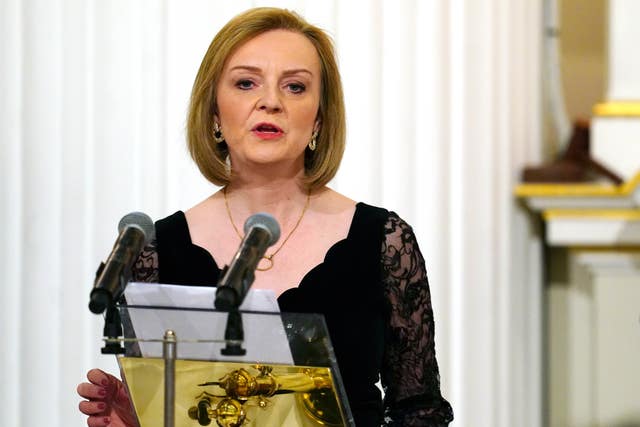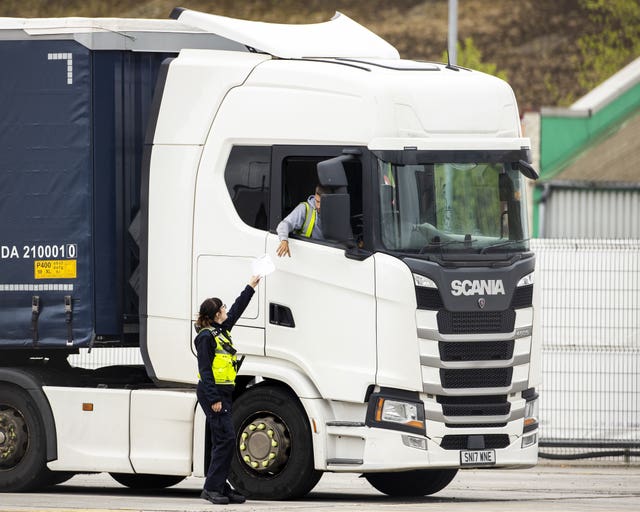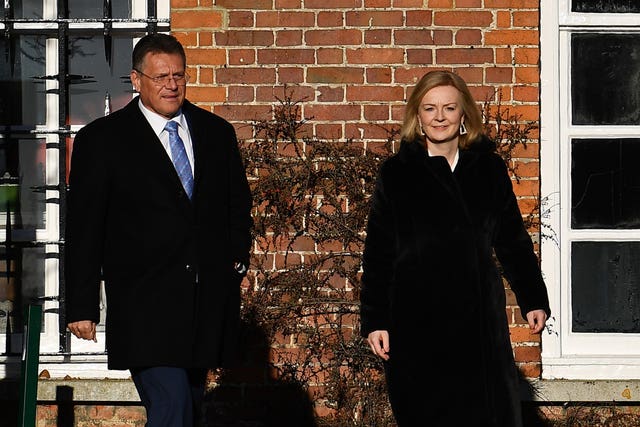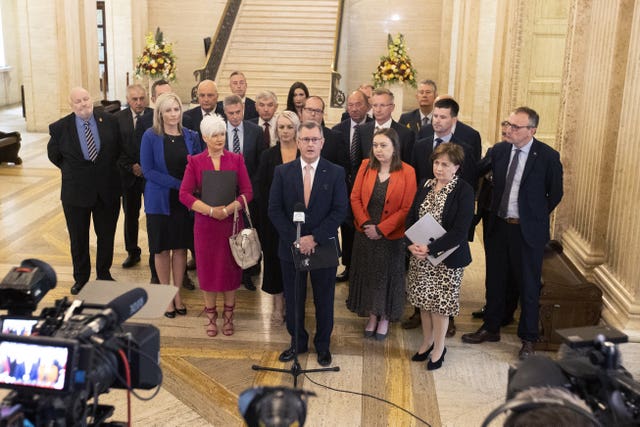Key questions on the latest twist to the Irish Sea border saga
Foreign Secretary Liz Truss has announced that the UK Government will legislate to override elements of the post-Brexit trading arrangements.

Foreign Secretary Liz Truss has announced the Government’s intention to table legislation to tear up parts of the controversial Northern Ireland Protocol.
Brussels has reacted negatively to the move, accusing London of undermining efforts to find an agreed way to resolve issues with the post-Brexit trade arrangements.
The EU has also threatened to retaliate if the UK proceeds with the bill, prompting concerns about a potential trade war.
Here are answers to some of the main questions following the latest twist in the Irish Sea border saga.
A bespoke arrangement contained within the Brexit Withdrawal Agreement that deals with Northern Ireland.
Jointly agreed by the UK and EU, it was an attempt to overcome the main log-jam in the divorce talks – the Irish land border.
To avoid disrupting cross-border trade and a return of checkpoints along the politically sensitive frontier, London and Brussels essentially decided to move new regulatory and customs processes to the Irish Sea.
That means checks on trade between Great Britain and Northern Ireland, rather than on goods moving north and south within the island of Ireland.
The protocol came into effect in January 2021, necessitating a range of regulatory animal and plant safety checks and inspections on a proportion of freight arriving at Northern Ireland ports.
Customs declarations are also required for incoming commercial goods.

While the rest of the UK has left, Northern Ireland effectively remains in the EU single market for goods.
The region must also apply the EU customs code at its ports, even though it is still part of the UK customs territory.
The protocol also sees Northern Ireland follow certain EU rules on state aid and VAT on goods.
Due to the extension of “grace periods” on several protocol provisions, a move taken unilaterally by the UK, the majority of envisaged checks are not yet being carried out.
Why has it proved so controversial?
The protocol is fiercely opposed by unionists and loyalists in Northern Ireland who claim it has undermined the region’s place within the UK.
There has been an unsuccessful legal challenge which has been referred to the Supreme Court and loyalist protest rallies have become increasingly frequent in recent months.
There have been some sporadic outbreaks of violence linked to the protocol, but these have not been widespread or sustained.
What about powersharing at Stormont?
The DUP has refused to return to devolved government following the recent Assembly election in protest at the protocol.
Northern Ireland’s 1998 Good Friday/Belfast peace agreement contains provisions to protect and develop relations both on a north/south basis on the island of Ireland and on an east/west basis between the island and Great Britain.
The DUP claims, and the Government agrees, that the protocol has upset this “delicate balance” of unionist and nationalist aspirations by undermining the east/west dynamic.
Without the agreement of Stormont’s main unionist party, an executive cannot be formed and the Assembly cannot sit.
The DUP has said it will only drop its boycott when the so-called Irish Sea border is removed.
However, a majority of MLAs in the newly elected Assembly represent parties that support the protocol’s retention.
They claim it offers Northern Ireland some protection from the negative economic consequences of Brexit and point to the unfettered access it offers traders from the region to sell into the EU single market.

There are differing views within Northern Ireland’s business community.
Those involved in bringing goods in from GB have experienced significant disruption to trade.
However, other companies that sell into Europe have benefitted from the dual market access dimension.
What businesses are at one on is the need for stability and certainty on their post-Brexit trading environment.
What action has the UK Government taken?
Protracted negotiations between the UK and European Commission have been rumbling on for around 18 months without sign of resolution.
Both sides have tabled proposals which the other has rejected.
The Government has now embarked on somewhat of a solo run, pledging to rip up aspects of the protocol by way of domestic legislation at Westminster.
Foreign Secretary Liz Truss cited the “grave and serious” powersharing impasse in Northern Ireland as justification for taking a step that, if enacted, would see the UK in breach of international law.
The unilateral action has been condemned in Brussels, with European Commission vice president Maros Sefcovic describing it as unacceptable.
He has warned that the EU would respond with “all measures at its disposal” if the UK presses ahead with the controversial plan, prompting concerns the dispute could spiral into a full-blown trade war.
However, Prime Minister Boris Johnson has insisted the Government still wants to secure an agreed outcome with the EU, describing the unilateral move in Westminster as an insurance policy that will only be used if a compromise settlement is not reached.

While the bill will not be published for several weeks, Ms Truss said it would make several changes to the current protocol arrangements.
They include:
The creation of green and red channels to differentiate between GB goods destined for use in Northern Ireland and shipments bound for onward transportation across the Irish border.
The Government wants goods arriving through the green channel to move free of red tape, while the red channel would involve checks and inspections at facilities at the Northern Ireland ports.
It proposes the use of trusted trader schemes and enhanced data sharing practices to provide assurances to the EU that the system is not being abused.
The legislation will also introduce hefty penalties for traders who illegally move goods from the UK into the single market.
The bill would change oversight arrangements to ensure the European Court of Justice is not the final arbitrator in any future trade disputes over the protocol.
The Government has not ruled out a role for the ECJ but wants an independent panel to have the final say in arbitration.
The law would also end the VAT and state subsidy differentials, with the Government unfettered by EU rules when deciding on tax and spending policies related to Northern Ireland.
It would also include the introduction of dual market standards systems to allow businesses to chose whether they comply with either EU or UK regulations.
Is the UK trying to scrap the protocol entirely?
No – only parts of it.
The Government wants to retain much of the protocol and has made clear that the dual market access provision could present a real opportunity to stimulate economic growth in Northern Ireland.
The focus of the legislation is primarily on the contentious aspects of the protocol that govern east/west trade across the Irish Sea.
Is this the much-threatened triggering of Article 16?
No. Article 16 is a mechanism within the protocol that enables either of the parties to the agreement to unilaterally suspend aspects of the arrangement if they believe they are causing economic, societal or environmental harm.
That would then trigger a fresh round of negotiations between the EU and UK to resolve the issues. The Government has repeatedly threatened to trigger over the last 18 months.
While triggering Article 16 is legally permissible within the terms of the protocol it would also bring matters to a head more rapidly.
Some believe the Government has chosen to go down the route of unilateral action at Westminster, embarking on a legislative process that could take many months, to provide more space to strike a deal with the EU while at the same time doing enough to potentially convince the DUP to return to powersharing.

In proposals published by the European Commission last October, Brussels acknowledged a need to treat goods destined for use in Northern Ireland differently to those “at risk” of entering its single market.
However, the EU only envisaged a reduction on checks for goods arriving through any potential green channel, not a complete discontinuation.
The EU has also moved to pass legislation to remove barriers on GB medicines travelling to Northern Ireland.
The commission has shown little appetite for minimising the role of the ECJ in protocol oversight.
Mr Sefcovic, who heads up Brexit negotiations for the commission, can only work within the mandate agreed by the member states.
For any agreement to be reached that came close to what the UK is suggesting, European leaders would need to sign off on an expanded negotiating mandate for the commission vice president.
It remains to been seen whether consensus on that issue could be achieved among the EU 27.
What about the prospects for powersharing in the interim?
DUP leader Sir Jeffrey Donaldson has said his party will take a “graduated and cautious” approach when judging the Government’s actions.
The DUP has been burned by promises from this Conservative government before – most famously Mr Johnson’s pledge never to agree to a Brexit deal that created economic barriers in the Irish Sea.
As such the party wants to see definitive progress in the passage of the legislation before it fully re-engages with the Stormont institutions.
The use of the word “graduated” may see it return incrementally, perhaps by first agreeing to nominate an Assembly speaker to allow the legislature to sit, even in the ongoing absence of a ruling executive.
When it might take that first step remained uncertain on Tuesday.
If the Assembly continues to sit empty the Government has made clear it will not delay in taking steps to cut the pay of the 90 elected members.





